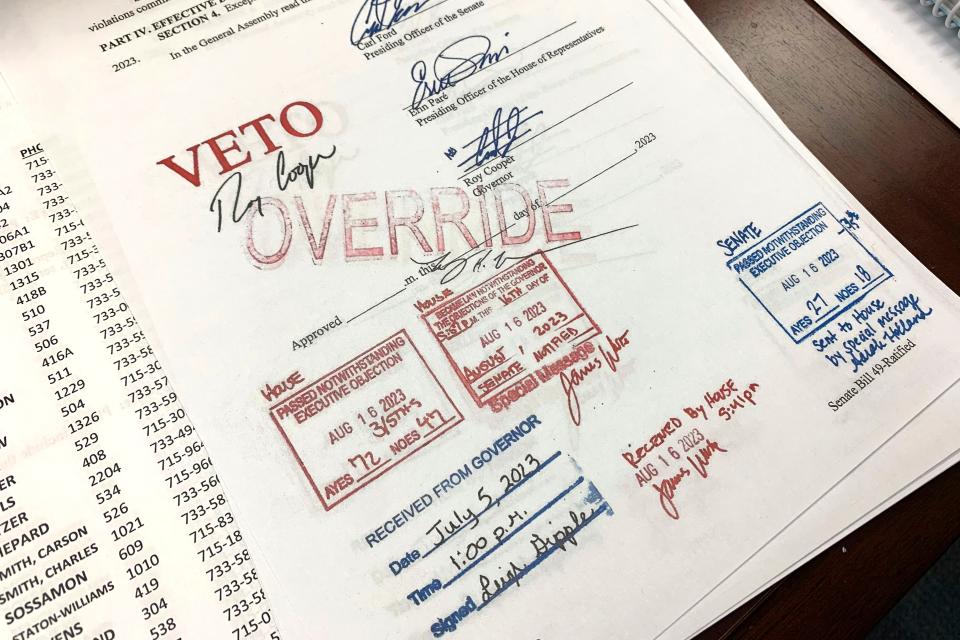What new Parent Bill of Rights Law means for Cumberland County Schools
- Oops!Something went wrong.Please try again later.
The Cumberland County Schools website states the district is “embracing” a newly enacted Parent Bill of Rights law that was passed by the North Carolina General Assembly earlier this month.
The new law sets forth 12 rights parents have when it comes to their child’s education, most of which policymakers and educators have said were already in place like having access to test scores or being able to inspect books or instructional materials.
The law also prohibits teachers from discussing gender identity or sexuality in kindergarten through fourth grades and requires education professionals to notify the parent if their child requests to change their name or pronoun.

How Cumberland County Schools is complying with the new law
According to Cumberland County Schools’ website, the Cumberland County Board of Education, “highly values parental engagement and respects the rights of parents in the education and upbringing of their children. ...
“We firmly believe parents are indispensable in their children's lives and education,” a statement added to the district’s website Thursday stated. “Our commitment involves empowering parents by upholding their rights to guide their children's education, access records, make medical decisions and engage with their academic progress.”
While the Cumberland County Schools website states that many of the rights in the law are “already addressed in existing board policy,” any updates “ concerning these rights will be added” to the district’s website.
Veto override
Sen. Amy Galey, R-Alamance County, said during the Senate’s Aug. 16 vote of 27-18 to override Gov. Roy Cooper’s veto of the bill that the Parents’ Bill of Rights law is about accountability for school systems and giving parents the resources they need to advocate for their children. Galey is a sponsor of the bill
“This bill will strengthen education in North Carolina by increasing parent involvement," she said.
Cooper, who vetoed the bill July 5, said the legislature has “wrong priorities,” to “pass legislation that discriminates” instead of working to pass a budget. The annual budget is usually passed by July 1.
“Yet, they still won’t pass a budget when (things like) teachers, school bus drivers and Medicaid Expansion for thousands of working people getting kicked off their health plans every week are desperately needed,” the governor said in Aug. 16 statement.
Cooper characterized the bill as a “Don’t Say Gay bill.”
"Parents are the most essential educators for their children and their involvement must be encouraged, but this bill will scare teachers into silence by injecting fear and uncertainty into classrooms,” he said.
The bill also “hampers the important and sometimes lifesaving role of educators as trusted advisers when students have nowhere else to turn,” he said.
According to the new law, there is an exemption on allowing parents access to any of their child’s education or health records if “a reasonably prudent person would believe that disclosure would result in the child becoming an abused juvenile or neglected juvenile.”
Controversy
Galey and other Republicans have said the bill is about supporting parents.
On June 28, during a debate on the bill, Galey said the point of the bill is to empower parents to raise their family “without being questioned or interrogated or undermined by the state of North Carolina.”
Galey said if students question teachers about topics like gender or sexuality, they should be referred back to their parents.
“We should not have public schools substituting themselves for parents,” she said.
Galey continued to say that the "controversy" around the Parent Bill of Rights comes down to its provisions about now allowing gender identity, sexual identity or sexual activity to be taught in lower grades or requiring parents to be notified if there’s a name or pronoun change.
She said parents are often notified by school officials if their child is pregnant, doing drugs, failing or having mental health problems while at school.
“Why is it that only in this sliver of this public policy discussion, are we concerned about how the parents are going to react … we should not look at parents across the state of North Carolina and assume that they’re going to be punitive against their children if they share an uncomfortable truth about themselves.”
Before the Senate’s Aug. 15 vote, Sen. Natasha Marcus, D-Mecklenburg County, said parents should and “do have rights about what their children do in public school.”
Marcus said parents she speaks to in her district and across the state tell her what they want the General Assembly to do about public education.
“Not one of them has said to me that they want to erase LGBTQ kids and their families from the classroom or make them feel excluded or out them to their parents before they are ready to talk about it,” she said.
Marcus said parents who advocated for the bill to become a law want to “create a false bubble.”

“Those parents also want us to ban books that they disagree with,” she said. “They want to control, not just what their children learn but what other people's children can learn, and they don't seem to care about the harm and the hurt that bills like Senate Bill 49 inflict — and make no mistake, this bill causes harm.”
A North Carolina school district told educators to ‘out’ trans students. Can they refuse?
NC Parents' Bill of Rights bill moves forward; critics say it could harm LGBTQ+ children
Supporters and opponents
The law has received both support and criticism from groups across the state.
“Parents already have the fundamental right to oversee the education and upbringing of their own children, but public schools have slowly been usurping those rights by hiding information and slipping radical ideologies into their lessons,” Tami Fitzgerald, executive director of the nonprofit, nonpartisan education lobbying organization, NC Values Coalition, said a news release Aug. 16. “SB 49 makes it clear, students belong to their parents, not to government schools.”
State Superintendent Catherine Truitt also supported the new law in an Aug. 17 social media post.
“As a former public school teacher and parent of three, I see the Parent’s Bill of Rights as a key way to open lines of communication between schools and parents so that parents remain a primary part of the conversation regarding their child’s academic, health, and overall wellbeing,” Truitt wrote.
Groups like the American Civil Liberties Union of North Carolina, Human Rights Campaign and the North Carolina Justice Center, and the LGBTQ+ rights group, Equality NC, have all issued statements against the new law.
“Transgender young people deserve to make choices about their own bodies, discuss their identities at school without fear of outing,” Liz Barber, director of policy and advocacy of the ACLU of North Carolina said in a statement.
Tamika Walker Kelly, a Fayetteville resident who is also president of the North Carolina Association of Educators, said in a statement Aug. 17, “Every student deserves the freedom to learn in a classroom that is safe and welcoming to all.
“As educators who are entrusted by parents with the responsibility to teach age-appropriate lessons and prepare their children for the future, we are very disappointed in today’s vote and worried for our students, especially those who are LGBTQ+."
Staff writer Rachael Riley can be reached at rriley@fayobserver.com or 910-486-3528.
This article originally appeared on The Fayetteville Observer: Cumberland County Schools faces new law met with LGBTQ controversy

